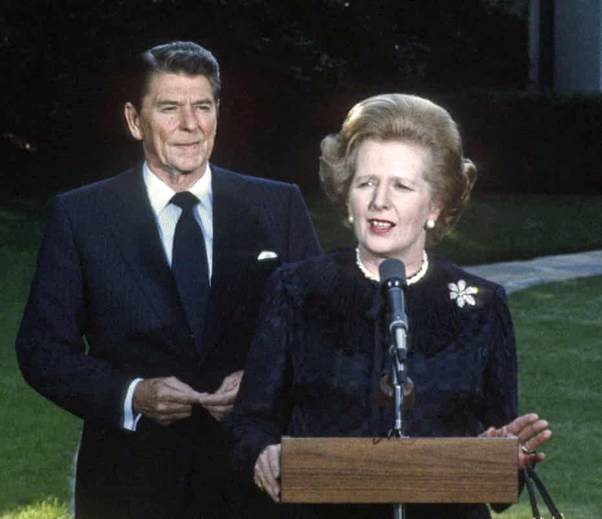Neo-Liberal Economics has come to mean the operation of the Free Market, particularly in the United States and UK.
Understanding the ideas behind the Free Market and its disastrous effects on the whole world:
- Inequality,
- Poverty,
- excessive riches,
- power grabs by powerful banks and corporations,
- degradation of democracy,
- and finally Destruction of the Planet through climate change, warfare and increasing migration
– all of these negative effects on mankind can in large part be put down to nearly 30 years of the Free Market
Explore all these ideas, opinions, facts, theories, effects through this website
So pervasive has neoliberalism become that we seldom even recognise it as an ideology. We appear to accept the proposition that this utopian, millenarian faith describes a neutral force; a kind of biological law, like Darwin’s theory of evolution. But the philosophy arose as a conscious attempt to reshape human life and shift the locus of power.
Neoliberalism sees competition as the defining characteristic of human relations. It redefines citizens as consumers, whose democratic choices are best exercised by buying and selling, a process that rewards merit and punishes inefficiency. It maintains that “the market” delivers benefits that could never be achieved by planning.
Attempts to limit competition are treated as inimical to liberty. Tax and regulation should be minimised, public services should be privatised. The organisation of labour and collective bargaining by trade unions are portrayed as market distortions that impede the formation of a natural hierarchy of winners and losers. Inequality is recast as virtuous: a reward for utility and a generator of wealth, which trickles down to enrich everyone. Efforts to create a more equal society are both counterproductive and morally corrosive. The market ensures that everyone gets what they deserve.
We internalise and reproduce its creeds. The rich persuade themselves that they acquired their wealth through merit, ignoring the advantages – such as education, inheritance and class – that may have helped to secure it. The poor begin to blame themselves for their failures, even when they can do little to change their circumstances.
What Is Neoliberalism?
Neoliberalism is a policy model that encompasses both politics and economics and seeks to transfer the control of economic factors from the public sector to the private sector. Many neoliberalism policies enhance the workings of free market capitalism and attempt to place limits on government spending, government regulation, and public ownership.
Neoliberalism is often associated with the leadership of Margaret Thatcher–the prime minister of the U.K. from 1979 to 1990 and leader of the Conservative Party from 1975 to 1990–and Ronald Reagan, the 40th president of the U.S. (from 1981 to 1989). More recently, neoliberalism has been associated with policies of austerity and attempts to cut government spending on social programs.
Tenets of Neo-Liberal economics
Neoliberalism mainly describes one’s desire for a free market that is largely untouched by the government. Words like deregulation and free trade are common in neoliberal arguments. Specific economic tenets include:
- No price control - preventing the government from establishing a maximum price for goods and service in the free market
- Reducing marginal tax rates - keeping federal and state taxes low as to keep the market flowing more efficiently
- Deregulating markets - reducing government influence in the free market by eliminating regulations that hamper economic growth
- Free trade - allowing international trade to continue without restrictions, such as tariffs
- Reducing government debt - reducing or eliminating government spending to keep government debt low

Quotation from Margaret Thatcher:
“I think we have gone through a period when too many children and people have been given to understand ‘I have a problem, it is the Government’s job to cope with it!’ or ‘I have a problem, I will go and get a grant to cope with it!’ ‘I am homeless, the Government must house me!’ and so they are casting their problems on society and who is society? There is no such thing! There are individual men and women and there are families and no government can do anything except through people and people look to themselves first.”
Understand more about the Free Market and its disastrous effects. Have a roam round this site for a complete exposure of the Free Market and its effects on Society, Humanity and the Planet!
Here are some specially selected articles from this website…
The Free Market and its Impacts : Explore the ideas behind the scenes
- The Free Market and Social Market
- UNDERSTAND THE THEORIES BEHIND FREE-MARKET FUNDAMENTALISM - ARE THEY SOUND, DO THEY WORK?
- SPREADING THE TRUE FAITH: NEO-LIBERAL FREE-MARKET NETWORKS
- The Free Market is Wrecking Society: we can now assess the effects after nearly 30 years.
- ALTERNATIVES TO NEO-LIBERAL FREE-MARKET PHILOSOPHIES - Social Market Theories
Society
- Society and the Market, Meaning and Obsessive Consumption
- Neoclassical Economics has failed Society.
- Anatomy of A Social Market Society: Sweden
- What makes societies healthy?
Finance
- DEMOCRACY DEFEATED BY INVESTMENT BANKS?
- THE PSYCHOLOGY OF CORPORATE IMMORALITY
- Wall Street and the Financialization of the Economy
- Popular Delusions and Misleading Myths about Finance and Markets



